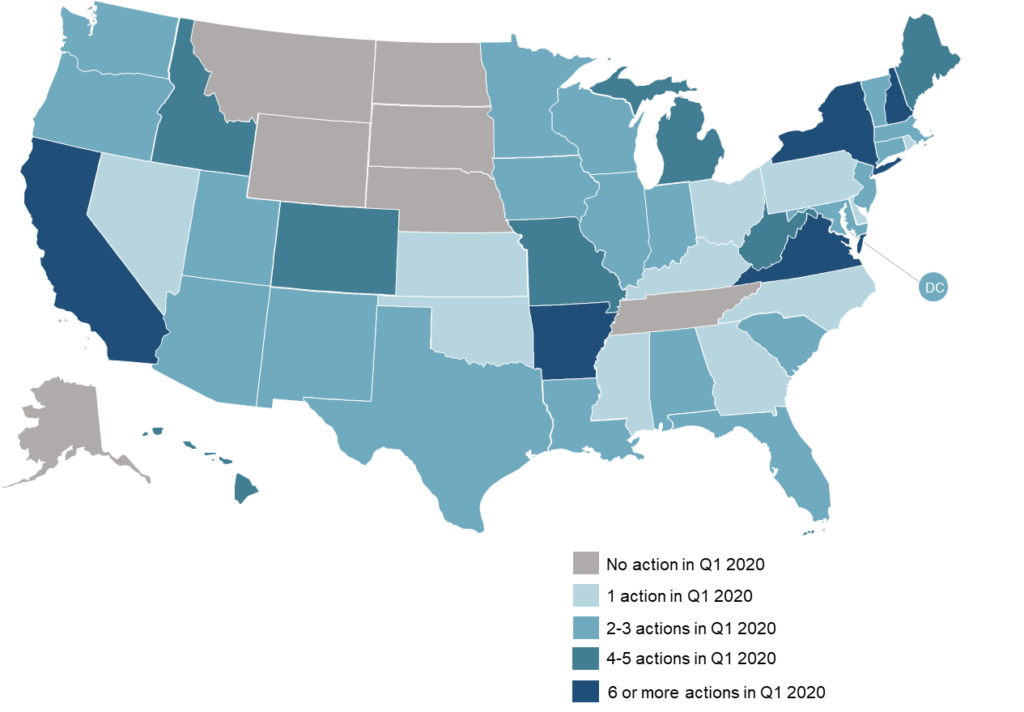The 50 States of Solar Report: State Lawmakers Focus on Expanding Solar Options During Q1 2020
Raleigh, NC – (April 22, 2020) The N.C. Clean Energy Technology Center (NCCETC) released its Q1 2020 edition of The 50 States of Solar. The quarterly series provides insights on state regulatory and legislative discussions and actions on distributed solar policy, with a focus on net metering, distributed solar valuation, community solar, residential fixed charges, residential demand and solar charges, third-party ownership, and utility-led rooftop solar programs.
The report finds that 43 states, plus the District of Columbia took some type of distributed solar policy action during Q1 2020 (see figure below), with the greatest number of actions continuing to address net metering policies, residential fixed charge or minimum bill increases, and community solar policies. A total of 155 distributed solar policy actions were taken during Q1 2020, with the greatest number of actions taken in Virginia, New York, New Hampshire, and California.
Q1 2020 Policy Action on Net Metering, Rate Design, and Solar Ownership

The report identifies three trends in solar policy activity taken in Q1 2020: (1) proposed legislation focusing on expansion of distribution solar options, (2) states blocking additional fees for distributed generation customers, and (3) states opting for slower, study-based approaches to net metering successor tariff development.
“Several states, including Iowa, Kansas, and Virginia, took or are considering actions that prevent utilities from applying additional charges, like standby or demand charges, to customers with distributed generation if these charges are not applied to non-DG customers as well,” noted David Sarkisian, Senior Policy Analyst at NCCETC.
The report notes the top five distributed solar policy actions of Q1 2020:
- Iowa lawmakers enacting net metering compromise legislation;
- Rocky Mountain Power filing its net billing export credit proposal in Utah;
- The Kansas Supreme Court overruling Evergy’s mandatory residential DG demand charge;
- Virginia legislators passing an array of distributed solar bills; and
- The California Public Utilities Commission rejecting utilities’ fixed charge proposals.
“Although COVID-19 is impacting state legislative sessions, lawmakers considered over 130 distributed solar policy bills during Q1 2020,” observed Autumn Proudlove, lead author of the report and Senior Manager of Policy Research at NCCETC. “The majority of these bills focused on expanding availability of net metering, community solar, and third-party ownership options.”
View the 50 States of Solar Q1 2020 Executive Summary
View and Purchase the 50 States of Solar Q1 2020 update FULL Report
View other 50 States Reports – Solar, Grid Modernization and Electric Vehicles
ABOUT THE N.C. CLEAN ENERGY TECHNOLOGY CENTER
The N.C. Clean Energy Technology Center, as part of the College of Engineering at North Carolina State University, advances a sustainable energy economy by educating, demonstrating and providing support for clean energy technologies, practices and policies. It serves as a resource for innovative, sustainable energy technologies through technology demonstration, technical assistance, outreach and training. For more information about the Center, visit: http://www.nccleantech.
MEDIA CONTACT: Shannon Helm, NCCETC, shannon_helm@ncsu.edu